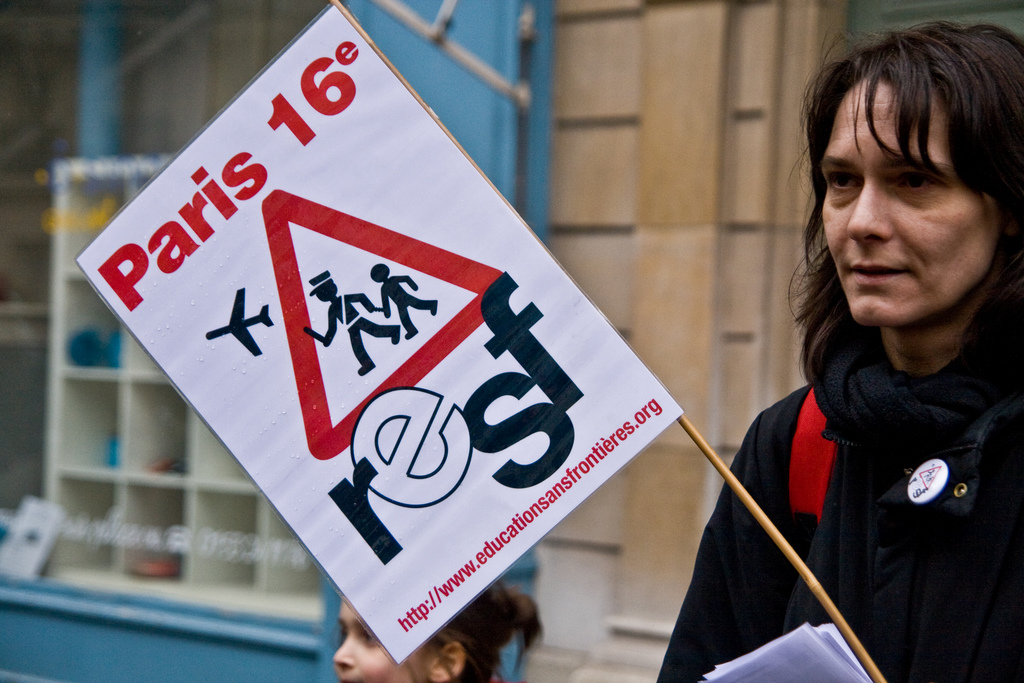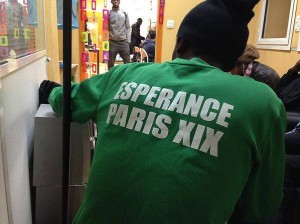This article was originally published in the January 2015 print edition of The Paris Globalist
By Yena Lee | Additional reporting by Saba MBoundza
Two years ago, fifteen-year-old Oumar* left his native Guinea-Conakry and arrived alone in Paris.
As a minor, he does not need to apply for a resident’s permit or a student visa. As a minor, he has the right to an education. This is why he is here. Bright, educated and from a well-to-do family, he says he had a happy childhood.
“Before, things were good. Family, school, football…”, he says in an interview outside his new high school.
After the death of his father, Oumar had to flee. As the oldest son of a first son, he was persecuted by one of his uncles for his inheritance. As Guinea is not in a war zone, he could not apply for asylum. He decided to emigrate to France, a logical choice as he already spoke the language.
Oumar is one of the hundreds of unaccompanied minors in Paris, out of an estimated 8,000 in the whole country. These migrants do not have legal guardians. Most are from former French colonies and the vast majority are boys. All of them have escaped from poverty or persecution.
But alone and with no friends or family, things were not going to be easy for these teenagers. Homeless shelters are either full or do not accept minors.
After barely setting foot on European soil, Oumar had to adjust to the climate and brace the winter in the streets.
“I slept on night buses and under the bridge at Stalingrad [metro station],” he says. He spent three months sleeping rough.
“It wasn’t easy. It was … experimental!”.
Embarrassed and afraid to worry his mother, he did not even tell her about his situation.
Fortunately , he found a charity called Aide et Defense des Jeunes Isolés Etrangers (ADJIE). Twice a week, volunteers help teenagers with their paperwork and legal troubles.
Less than half an hour after ADJIE opens, there is always already a long queue at their office in the north of Paris. Malians, Guineans, Nigerians, Gabonese and a few Afghans and Bangladeshis line up to talk one-to-one with a volunteer about their situation.
Stories of sub-Saharan Africans who cross the continent and face discrimination and violence in Morocco before they manage to escape to Europe are not uncommon. On this particular day, one boy at ADJIE explained that he came to France via Lampedusa, where a boat notoriously capsized in 2013, resulting in more than 350 deaths. These teenagers risk their lives for a better education in France.
French social services take care of children in various circumstances. They are legally obliged to help foreign minors too. Once they have accepted a foreigner as an unaccompanied minor, they provide housing, food, French lessons, psychological care – as they would to any French national who is in their care.
The problem is that only 40% of foreign youth who ask to be taken into care are actually accepted. A myriad of bureaucracy and lack of resources make it hard for minors like Oumar to be placed in the system.
“ADJIE helped me apply for social services, but I failed the bone test. Then they helped me appeal. But that was rejected too.”
French authorities use a bone test system to determine the age of migrants. Condemned by the EU and banned in the UK, this system of defining age is deemed unscientific.
The test was originally conceived for height prediction and not age. It can give results with 15 or 20 year margin of error. But these calculations are crucial for unaccompanied minors – most of whom arrive in France in their late teens. It is an age when boys start to resemble men and girls are already women.
More curiously, Oumar’s appeal was rejected by the juvenile court system with an interesting letter.
“Judging by the evidence we have cited above, we have serious doubts about the authenticity of these documents”.
Although Oumar’s birth certificate was validated by his Embassy, the courts rejected these identification papers. One of the arguments brought forward by the court was that his place of birth stated on his birth certificate did not match his place of residence on his consular card. Whether this was a detail that raised doubts or a bureaucratic mistake on their part, it will be near-impossible to rectify.
Despite the authorities rejecting his status as a minor, they do not consider him to be an adult either. All the better for him, as they cannot expulse children from the country, but difficult when minors like Oumar want to sleep in homeless shelters.
In the interest of safety, children are not often allowed to sleep in shelters – ironically their only solution is the streets or emergency housing offered by social services.
Parisian social services have 20-25 beds per night reserved for foreign migrants as emergency solutions. Charities such as ADJIE say that there are between 70 – 85 teenagers queueing up every evening since September.
Thanks to charities such as ADJIE and Education Without Borders, many teenagers are enrolled in school, as is their right. But after class, they have no place to go. Recently, a student union picked up on this situation and started to host fellow teenagers at their small office, providing food, a roof and solidarity.
“FIDL is doing the job of the French government – we are protecting undocumented high school students” reads a sign outside their building.
A student union with one bed and a few mattresses cannot house all the homeless students in Paris, nor can they do it forever.
Oumar is not one of the dozen students camping out at the FIDL (Independent and Democratic High-School Federation). He has been living at a retired teacher’s house for the past year. Mr Martinez* volunteered at ADJIE when he met Oumar. When he found out the teenager was sleeping rough, he decided to host him in a spare room.
“He’s a very kind man,” says Oumar.
“He comes home from traveling just to fill up the fridge with more food for me.” Mr Martinez is also helping Oumar with his paperwork, meaning that he spends less time down at the ADJIE after school.
With a roof over his head and a full stomach, Oumar can concentrate on his studies. Despite the distance with his family and his fragile legal situation, he is a motivated student. Top of his class in his Parisian high school, Oumar hopes to work in military logistics when he grows up.
“Now, I’m fine,” explains Oumar. “But if you saw me back when I was sleeping under the bridge you wouldn’t have been able to recognize me.”
He is not alone. The majority of unaccompanied minors spend a few months fending for themselves in the streets. Girls and teenagers from well-known war zones are quickly picked up by the authorities. For the rest, a system designed to deter awaits them.
Even a positive reply from the system is often too little, too late. A reply from the judge takes at least four months and an appeal takes a year. For some teenagers, even if social services finally validate their age, they are no longer minors.
This January, Oumar turned eighteen, leaving him vulnerable for deportation at every police check. Hopefully he will at least be able to make it until June, to pass his high school diploma, the Baccalauréat.
In December 2014, two students from a town near Paris received orders to leave French soil within 30 days. Students rallied together and organized demonstrations to support their classmates. After weeks of general disruption and media interest, the local mayor’s office decided to reexamine their paperwork. One has been granted a residence permit, whilst the other’s demand was rejected once again. Like Oumar, he has to hope he will make it until graduation. Even if these teenagers have no choice but to leave France, they hope to leave at least with a diploma in hand.
Featured Image Credit: Philippe Leroyer, Flickr CC. License available here.


